Today Current Affairs: 7th October 2021 for UPSC IAS exams, State PSC exams, SSC CGL, State SSC, RRB, Railways, Banking Exam & IBPS, etc
Table of Contents
JIMEX : 5th Edition

The fifth edition of India – Japan Maritime Bilateral Exercise, JIMEX, between the Indian Navy (IN) and the Japan Maritime Self-Defence Force (JMSDF), will be held in Arabian Sea from 06 to 08 October 2021.
- JIMEX series of exercises commenced in January 2012 with special focus on maritime security cooperation. The last edition of JIMEX was conducted in September 2020.
- JIMEX-21 aims to develop common understanding of operational procedures and enhance inter-operability through conduct of a multitude of advanced exercises, across the entire spectrum of maritime operations.
- Multi-faceted tactical exercises involving weapon firings, cross-deck helicopter operations and complex surface, anti-submarine and air warfare drills will consolidate coordination developed by the two navies.
Mihidana: Geographical Identification:

First consignment of Geographical Identification (GI) tagged sweet dish Mihidana sourced from Bardhaman, West Bengal has been exported to the Kingdom of Bahrain
- Recently, to commemorate the historical legacy of a century old sweet delicacy & GI certified – Jaynagarer Moa, prepared from popped-rice ball & fresh date-palm jaggery, in Jaynagar, West Bengal, India Post in collaboration with APEDA released a specially designed envelope.
- In January, 2021, a consignment of Jaynagar Moa was exported to the Kingdom of Bahrain.
- In August, 2021, India Post released a special cover on West Bengal”s sweetmeats Mihidana and Sitabhog.
- West Bengal’s Bardhaman got the GI tag for the century-old sweetmeats in 2017.
The State Of The World’s Children 2021:
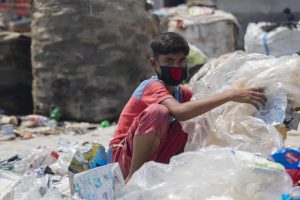
Shri Mansukh Mandaviya, Union Minister for Health and Family Welfare released UNICEF’s global flagship publication – “The State of the World’s Children 2021; On My Mind: promoting, protecting and caring for children’s mental health”.
- The report details the significant impact of COVID-19 pandemic on children’s mental health.
- The report has found that around 14 percent of 15 to 24-year-olds in India, or 1 in 7, reported often feeling depressed or having little interest in doing things. Across 21 countries, the median was one in five young people.
- In the UNICEF survey across 21 countries, only 41 per cent of young people in India were willing to seek support for mental health problems, compared to an average of 83 per cent for 21 countries.
- As per the report, India was the only one of 21 countries where only a minority of young people felt that people experiencing mental health issues should reach out to others. In every other country, a majority of young people (ranging from 56 to 95 per cent) felt that reaching out was the best way to deal with mental health issues.
- Over 286 million children up to grade 6 were out of school in India between 2020-2021. UNICEF’s rapid assessment in 2021 found that only 60 per cent could access digital classrooms. Many would not be able to continue their education.
- Meanwhile, wide gaps persist between mental health needs and mental health funding. India has spent only 0.05 per cent of its health budget annually on mental health, according to Indian Journal of Psychiatry 2017.
- As the trend of nuclear family instead of joint family has increased in our society, mental health problems have become frequent in children.
PM CARES For Children:
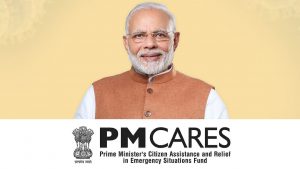
A total of 845 COVID-19 orphans have so far been identified and approved for receiving benefits under the PM CARES Fund.
- The Scheme Launched in May 2021.
- The scheme has been launched for support & empowerment of Covid affected children.
- All children who have lost both parents or surviving parent or legal guardian/adoptive parents due to Covid 19 will be supported under the scheme.
Features of the scheme:
- Fixed Deposit in the name of the child: A corpus of Rs 10 lakh for each child when he or she reaches 18 years of age.
- School Education: For children under 10 years: Admission will be given in the nearest Kendriya Vidyalaya or in a private school as a day scholar.
- School Education: for children between 11-18 years: The child will be given admission in any Central Government residential school such as Sainik School, Navodaya Vidyalaya etc.
- Support for Higher Education: The child will be assisted in obtaining an education loan for Professional courses / Higher Education in India as per the existing Education Loan norms.
- Health Insurance: All children will be enrolled as a beneficiary under Ayushman Bharat Scheme (PM-JAY) with a health insurance cover of Rs 5 lakhs.
Revolutionary Freedom Fighter Shyamji Krishna Varma:
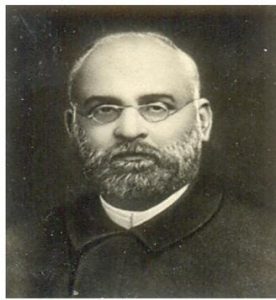
The Prime Minister paid tributes to revolutionary freedom fighter Shyamji Krishna Varma on his birth anniversary (4th October).
- Shyamji Krishna Varma was born on 4th October, 1857 in Mandvi town of Kachchh district of Gujarat.
- He was an expert in Sanskrit and other languages.
- His deep knowledge of the Sanskrit language caught the attention of Monier Williams, a professor of the subject in Oxford University.
- He was inspired by Bal Gangadhar Tilak, Swami Dayanand Saraswati and Herbert Spencer.
- He founded the Indian Home Rule Society, India House and The Indian Sociologist in London.
- Indian Home Rule Society and the India House worked towards inspiring youngsters in Britain to take up revolutionary activities against their own representatives in India.
- The monthly Indian Sociologist became an outlet for nationalist ideas and through the Indian Home Rule Society, he criticised the British rule in India.
- Varma became the first President of Bombay Arya Samaj. He inspired Veer Savarkar who was a member of India House in London. Verma also served as the Divan of a number of states in India.
- Swami Dayanand Saraswati was the founder of the Hindu reform organisation Arya Samaj.
- He was a barrister in London, when in 1905, he was barred from practising law by the Inner Temple following charges of sedition for writing against the colonial government.
- The move was significant as the Honourable Society of the Inner Temple is one of the four professional associations for barristers and judges in London.
- He was posthumously reinstated by the Inner Temple in 2015 after the Inn’s governing council noted that Varma “did not receive an entirely fair hearing”.
- In the face of criticism by the British, Varma shifted his base from England to Paris and continued his movement.
- After the outbreak of the First World War (1914-18), however, he moved to Geneva in Switzerland and spent the rest of his life there. He died on 30th March, 1930.
2nd Phase AMRUT Mission:
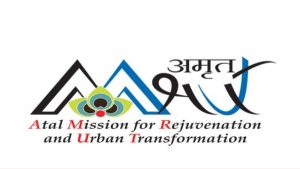
The Prime Minister launched the second phase of Atal Mission for Rejuvenation and Urban Transformation (AMRUT 2.0).
- The Ministry of Housing and Urban Affairs (MoHUA) is the nodal ministry for the scheme.
- It is the continuation of the AMRUT mission launched in June 2015 to ensure that every household has access to a tap with the assured supply of water and a sewerage connection.
- AMRUT 2.0 aims to provide 100% coverage of water supply to all households in around 4,700 ULBs (Urban Local Bodies).
- It also seeks to promote Atmanirbhar Bharat through encouraging Startups and Entrepreneurs (Public Private Partnership).
- Objectives:
- It will build upon the progress of AMRUT to address water needs, rejuvenate water bodies, better manage aquifers, reuse treated wastewater, thereby promoting a circular economy of water.
- It will provide 100% coverage of sewerage and septage in 500 AMRUT cities.
- Recycling and reuse of treated wastewater is expected to cater to 20% of total water needs of the cities and 40% of industrial demand.
- Under the Mission, fresh water bodies will be protected from getting polluted to make natural resources sustainable.
- Pey Jal Survekshan will be conducted in cities to ascertain equitable distribution of water, reuse of wastewater and mapping of water bodies.
Performance of AMRUT Phase-I:
- 1.14 crore water tap connections have been provided taking total connections to 4.14 crore in AMRUT cities.
- Credit rating work has been completed in 470 cities. Of which, 164 cities have received Investable Grade Rating (IGR), including 36 cities with rating of A- or above.
- Rs 3,840 crore has been raised through Municipal Bonds by 10 ULBs. The Online Building Permission System has been implemented in 2,471 cities including 455 AMRUT cities.
- This reform has helped improve India’s rank in Ease of Doing Business in construction permits to 27 in Doing Business Report (DBR) 2020 of World Bank from 181 in 2018.
- 89 lakh conventional streetlights have been replaced with energy efficient LED lights, leading to estimated energy savings of 195 crore units per annum & reduction in CO2 emission by 15.6 lakh tons per annum.
Astro Robot:

Amazon has unveiled its ‘Astro’ home robot, which is designed to help customers with a range of tasks like home monitoring and keeping in touch with family.
- However, civil society has highlighted the concerns of privacy issues of 24×7 surveillance.
About Astro Robot:
- Astro is primed to be a home security device. It is designed to move around the home and keep a check on pets, and detect something unusual in the absence of the owner.
- It comes with a “periscope” camera that pops up from its head and can be used to keep an eye on the home.
- It is basically a combination of the Echo Show (smart speaker) and sophisticated Ring security camera integrated into one single device.
- The device captures live videos, recognises faces, plays music or videos, and delivers a beer across the home.
- It can recognise the faces of people and analyse them until it figures out if it’s a family member or an outsider.
Physics Nobel Prize 2021:
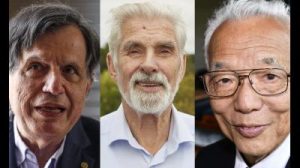
U.S.-Japanese scientist Syukuro Manabe, Klaus Hasselmann of Germany and Giorgio Parisi of Italy won the Nobel Physics Prize for climate models and the understanding of physical systems.
- Manabe, 90, and Dr. Hasselmann, 89, share one half of the 10 million kronor ($1.1 million) prize for their research on climate models, while Dr. Parisi, 73, won the other half for his work on the interplay of disorder and fluctuations in physical systems.
- This is the first time climate scientists have been awarded the Physics Nobel.
- The IPCC had won the Peace Nobel in 2007, an acknowledgement of its efforts in creating awareness for the fight against climate change, while a Chemistry Nobel to Paul Crutzen in 1995, for his work on the ozone layer, is considered the only other time someone from atmospheric sciences has won this honour.
Global Coral Reef Monitoring Network:
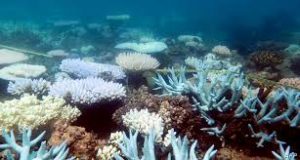
Global Coral Reef Monitoring Network (GCRMN) has released a report on the status of coral reefs across the world.
- The report, the first of its kind in 13 years, underlined the catastrophic consequences of global warming but said that some coral reefs can be saved by arresting greenhouse gases.
Highlights of the report:
- In the last decade, the world lost about 14 per cent of its coral reefs.
- Threats: Ocean-acidification, warmer sea temperatures and local stressors such as overfishing, pollution, unsustainable tourism and poor coastal management.
- Impact of global warming: Coral reefs across the world are under relentless stress from warming caused by climate change. Coral bleaching events caused by rise in elevated sea surface temperatures (SST) were responsible for coral loss.
- Loss of hard coral cover: There has been a steady decrease in hard coral cover in the last four decades since 1978 when the world lost nine per cent of its corals. The decrease is disconcerting because live hard coral cover is an indicator of coral reef health.
- Algal bloom: Algal bloom on coral ridges are a sign of stress on the structures. Since 2010, the amount of algae on the world’s coral reefs has increased by about 20 per cent.
Forest Conservation Act (FCA):
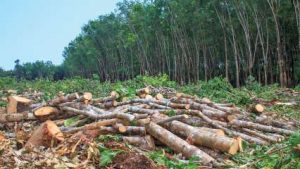
The Union Government has proposed certain amendments to the existing Forest Conservation Act (FCA).
Proposed changes:
- Absolve agencies involved in national security projects and border infrastructure projects from obtaining prior forest clearance from the Centre.
- Such a permission is necessary under the Forest Conservation Act (FCA).
- Exempt land acquired before 1980 — before the FCA came into effect — by public sector bodies such as the Railways.
- Facilitating private plantations for harvesting and exploration or extraction of oil and natural gas deep beneath forest land by drilling holes from outside the forest areas.
- Building in forests: To ease the grievances of the individuals whose land fall in state specific private forests act or within the purview of dictionary meaning of forest, the ministry has proposed to allow them the right to construct structures for bonafide purposes including forest protection measures and residential units up to an area of 250 sq mtr as one time relaxation.
- Punishments: Make offences under the modified Act punishable with simple imprisonment for a period which may extend to one year and make it cognisable and non-bailable.
- It also has provisions for penal compensation to make good for the damage already done.
The FCA first came in 1980 and was amended in 1988.
- While States had already notified forest land, the FCA made it necessary to get the Centre’s permission for using such forest land for “non forestry purposes” and the creation of an advisory committee to recommend such re-classification.
- The 1996 Supreme Court judgment (in TN Godavarman Thirumulpad versus Union of India and Others case) paved the way for the calculating:
- The net present value, or the economic value of the portion of forest being razed for development work that had to be paid by project proponents.
- The creation of a compensatory afforestation fund.
- Providing non-forestry land in lieu of the diverted forest.
Senkaku Islands In Japan:

New Japanese Prime Minister Fumio Kishida has said that he received a “strong” message from President Joe Biden about the United States’ commitment to defending the disputed East China Sea islets, known as the Senkaku Islands in Japan.
- As per the U.S.-Japan security treaty, the U.S. has obligations to defend Japan, which cover the uninhabited island.
- The Senkaku Islands are located in the East China Sea between Japan, the People’s Republic of China, and the Republic of China (Taiwan).
- The archipelago contains five uninhabited islands and three barren rocks, ranging in size from 800 m2 to 4.32 km2.
- The Senkaku Islands were not included in the territory which Japan renounced under Article 2 of the San Francisco Peace Treaty of 1951 that legally defined the territory of Japan after World War II.
- Under Article 3 of the treaty, the islands were placed under the administration of the United States as part of the Nansei Shoto Islands.
- The Senkaku Islands are included in the areas whose administrative rights were reverted to Japan in accordance with the Agreement between Japan and the United States of America Concerning the Ryukyu Islands and the Daito Islands that entered into force in 1972.
- China says that the islands have been part of its territory since ancient times, serving as important fishing grounds administered by the province of Taiwan.
- Taiwan was ceded to Japan in the Treaty of Shimonoseki in 1895, after the Sino-Japanese war.
- When Taiwan was returned in the Treaty of San Francisco, China says the islands should have been returned too.
- The Senkaku/Diaoyu issue highlights the more robust attitude China has been taking to its territorial claims in both the East China Sea, the South China Sea and also on the Indian side.




